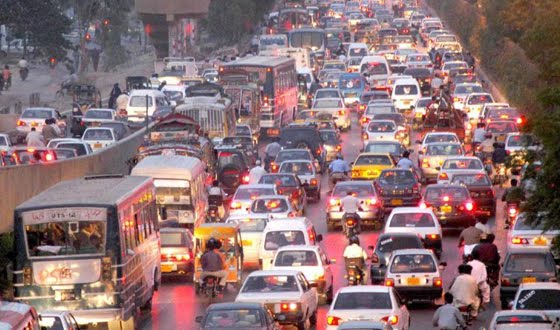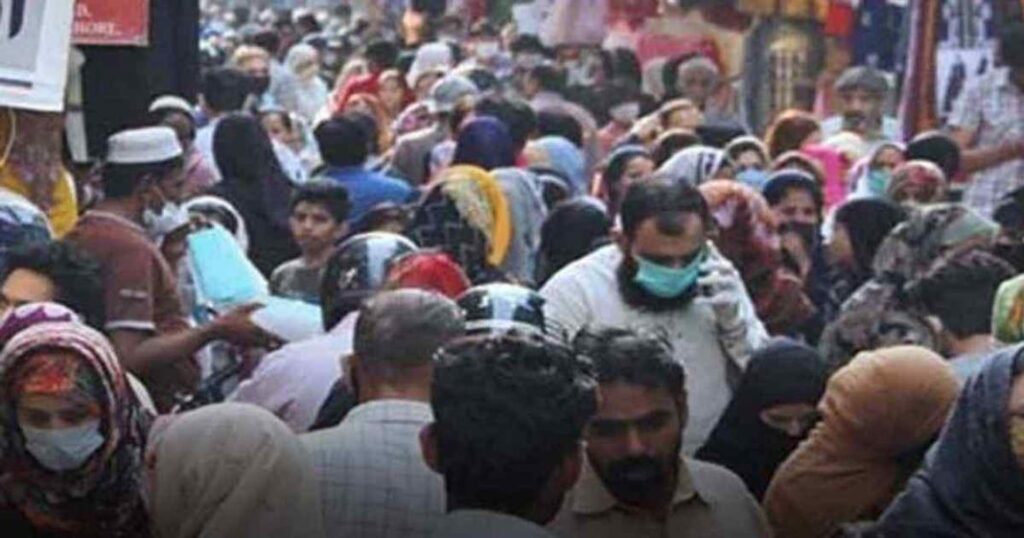
Pakistan is among the few countries in the world where there is a comprehensive population policy and program roadmap at the federal and provincial levels.
By Ghulam Haider
According to the new statistics released by the United Nations, the world’s population has crossed the eight billion mark, and out of this eight billion, almost three percent of the population consists of Pakistan.
Pakistan is among the eight countries in the world that will contribute fifty percent to the total population growth in the world by 2050.
Apart from Pakistan, these countries include Congo, Egypt, Ethiopia, India, Nigeria, Philippines and Tanzania.
Currently, Pakistan is the fifth largest country in the world in terms of population. China, India, USA and Indonesia are ranked first, second, third and fourth respectively in terms of population.

According to the statistics released by the United Nations, since the 1960s, the rate of population growth has been declining all over the world and in 2020 the rate is less than one percent.
Between 1962 and 1965, the highest rate was 2.1 percent.
While the population growth rate in the whole world was less than one percent, the same rate was recorded in Pakistan at 1.9 percent.
Rapidly growing population
The rate at which Pakistan’s population is increasing, is it an alarm bell for Pakistan and will resources be available in the country to meet the needs of such a population in future?
Population Council’s Senior Director Programs and Research Dr. Ali Mohammad Mir believes that population growth at this rate is an alarm bell for Pakistan.
He says that Pakistan’s rapid population growth is dangerous because of the imbalance between population and resources.
Due to the rapidly growing population, natural and mineral resources are decreasing, the main example of which is water scarcity. Similarly, due to shortage of other resources like oil and gas, Pakistan is also facing an energy crisis.
The country’s infrastructure is also inadequate for the size of the population and it is extremely difficult for any government to provide adequate number of educational institutions, hospitals and roads for such a large population.
Economist Dr. Khaqan Najib agrees with Dr. Ali Mohammad Mir that population growth at this rate is creating difficult conditions and Pakistan has to think about this speed of population growth.
He says that every year, around two million youths are joining the job market of Pakistan and this is the result of the growing population.
“If Pakistan’s economy grows at the rate of six to eight percent every year, then we can create so many jobs. Along with this, the remaining resources of Pakistan such as water, energy and other basic needs in cities are putting enormous burden on the population. At the moment, the resources are not increasing at all. If there is concern about the future, then we have to think about it.
‘Government intentionally overstates population’
But economist Dr. Ashfaq Hasan is not ready to give much importance to these figures released by the United Nations. They say that firstly these are not United Nations figures and secondly they are not showing the correct picture of our population.
The United Nations does not collect this data itself. This is the data provided by the government of Pakistan itself that the population of Pakistan is increasing at the rate of 1.9%. Second, the population of Pakistan is not as much as the government says. We have deliberately over-represented our population. In a country in which the distribution of resources between the provinces is done by keeping the population in front, why will the provinces not show their population more.
In support of his argument, Dr. Ashfaq cites the example of the ration card system issued in the sixties.
“In the sixties, the ration card system was implemented in Pakistan and three to four members of each family were registered in this system and the family was extended so that each person could get two kilos of sugar.”
What needs to be done to bring the situation under control?
There is no doubt that resources are not increasing at the rate at which Pakistan’s population is increasing, so what does Pakistan need to do at this time?
Dr. Ali Muhammad Mir believes that along with the government, the people themselves will have to think about it.
He says that every person living in the country should be aware of the rights of his family and should also realize his responsibilities to pay these rights. When each person realizes his responsibilities, he will balance the size of his family.
Dr. Khaqan Najeeb believes that Pakistan also needs to focus on increasing its resources.
He says that we need to focus on our cities along with the need to take measures to stop the growth of our population. Cities have to be improved and made in such a way that they can not only play their role in economic development but also bear the pressure of growing population
‘Access to family planning facilities is essential’
According to Dr. Ali Mir, everyone’s access to family planning facilities and information is very important to achieve population balance.
He says that there are 17 percent of married couples in Pakistan who want to do family planning but have not done so. The government should promote family planning information and facilities, especially ensuring the provision of family planning facilities and information from all medical centers in the country. Along with this, lady health workers have to play their role in ensuring the provision of family planning facilities.
According to Dr. Ali Mir, Ulama have a great role in shaping the mindset of the people in Pakistan and they will have to play their role in reducing the pressure of the growing population.
There is a consensus among scholars on the need for a proper break between children to improve health of mother and child, the need is to publicize it and it is also the responsibility of the government.
Pakistan is among the few countries in the world where there is a comprehensive population policy and program roadmap at the federal and provincial levels.
According to experts, there is a need to start implementing these policies and programs together with other stakeholders. Hence, meeting the needs of our population will become more difficult in the coming days due to rapid population growth and the economic conditions of Pakistan.
The prognosis for Pakistan, however, is quite different but no less alarming. Here we have seen a sixfold increase in population since independence and every year we add some 4 to 5 million people to the count, which is equivalent to the entire population of New Zealand.
More alarming, our growth rate remains at 2 percent or higher, which outpaces any other Muslim country and while our fertility rate is also declining, it isn’t doing so nearly fast enough. If this continues, and there is no reason it won’t, we will be the world’s fifth most populous country by 2100 with a projected population of 403 million.
Why is that a bad thing? Simply put, we will have far too many mouths to feed and when you factor in the shrinking of agricultural land in favor of housing societies (a trend that will escalate in the future) you can safely assume that food shortages and food inflation will be the norm.
Even by 2050, we will have a labor force that has doubled in size, from 100 million today to an estimated 200 million, meaning that to keep unemployment under a semblance of control, we will need to add 60 million more jobs by then.
This then means that our GDP growth will have to be in the double digits just to keep pace and if our economy were to, by some miracle, gallop at the speed of Usain Bolt on a good day, we will – if we’re lucky — end up standing still. And yet, this is not even a discussion that we are having. We are not seeing that this ticking population bomb is perhaps the greatest existential threat we are facing.
Forget about solutions, we haven’t even acknowledged the problem.

